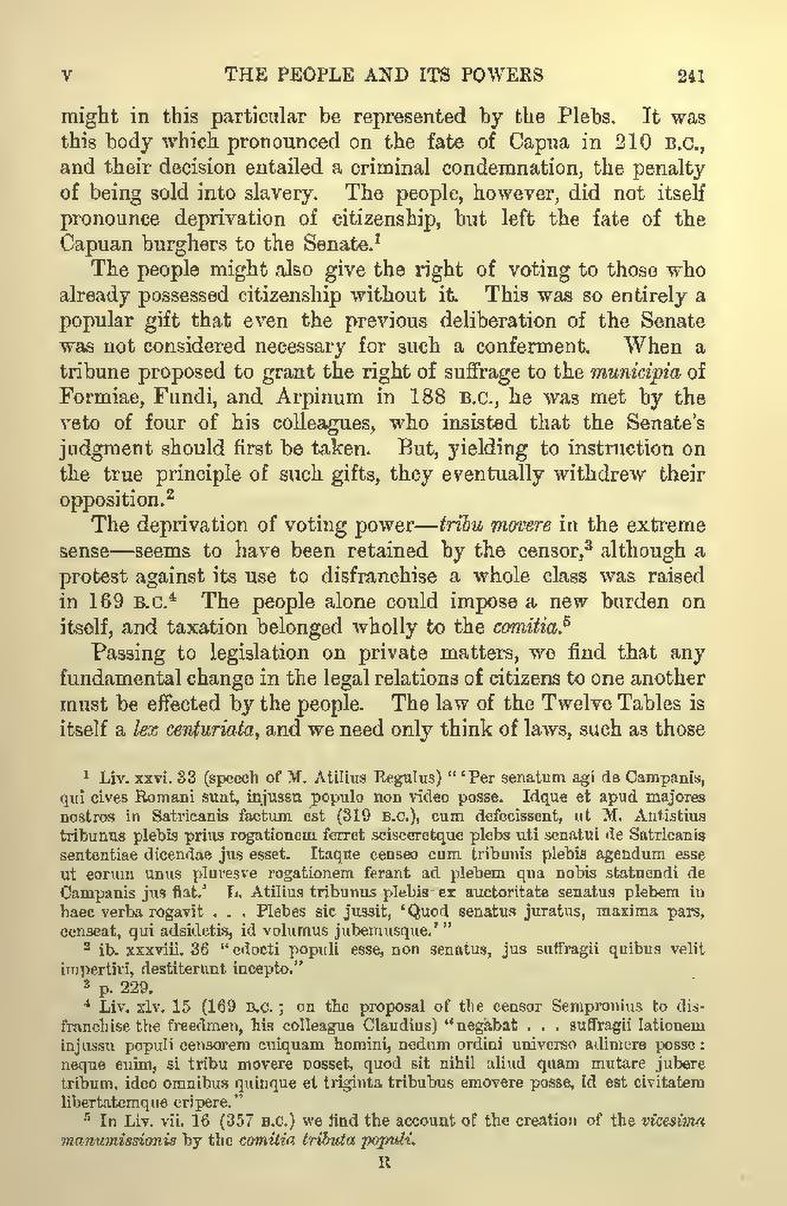might in this particular be represented by the Plebs. It was this body which pronounced on the fate of Capua in 210 B.C., and their decision entailed a criminal condemnation, the penalty of being sold into slavery. The people, however, did not itself pronounce deprivation of citizenship, but left the fate of the Capuan burghers to the Senate.[1]
The people might also give the right of voting to those who already possessed citizenship without it. This was so entirely a popular gift that even the previous deliberation of the Senate was not considered necessary for such a conferment. When a tribune proposed to grant the right of suffrage to the municipia of Formiae, Fundi, and Arpinum in 188 B.C., he was met by the veto of four of his colleagues, who insisted that the Senate's judgment should first be taken. But, yielding to instruction on the true principle of such gifts, they eventually withdrew their opposition.[2]
The deprivation of voting power—tribu movere in the extreme sense—seems to have been retained by the censor,[3] although a protest against its use to disfranchise a whole class was raised in 169 B.C.[4]. The people alone could impose a new burden on itself, and taxation belonged wholly to the comitia.[5]
Passing to legislation on private matters, we find that any fundamental change in the legal relations of citizens to one another must be effected by the people. The law of the Twelve Tables is itself a lex centuriata, and we need only think of laws, such as those
- ↑ Liv. xxvi. 33 (speech of M. Atilius Regulus) "'Per senatum agi de Campanis, qui cives Romani sunt, injussu populo non video posse. Idque et apud majores nostros in Satricanis factum est (319 B.C.) cum defecissent, ut M. Antistius tribunus plebis prius rogationem ferret scisceretque plebs uti senatui de Satricanis sententiae dicendae jus esset. Itaque censeo cum tribunis plebis agendum esse ut eorum unus pluresve rogationem ferant ad plebem qua nobis statuendi de Campanis jus fiat.' L. Atilius tribunus plebis ex auctoritate senatus plebem in haec verba rogavit . . . Plebes sic jussit, 'Quod senatus juratus, maxima pars, censeat, qui adsidetis, id volumus jubemusque.'"
- ↑ ib. xxxviii. 36 "edocti populi esse, non senatus, jus suffragii quibus velit impertiri, destiterunt incepto."
- ↑ p. 229.
- ↑ Liv. xlv. 15 (169 B.C.; on the proposal of the censor Sempronius to disfranchise the freedmen, his colleague Claudius) "negabat . . . suffragii lationem injussu populi censorem cuiquam homini, nedum ordini universo adimere posse: neque enim, si tribu movere posset, quod sit nihil aliud quam mutare jubere tribum, ideo omnibus quinque et triginta tribubus emovere posse, id est civitatem libertatemque eripere."
- ↑ In Liv. vii. 16 (357 B.C.) we find the account of the creation of the vicesima manumissionis by the comitia tributa populi.
